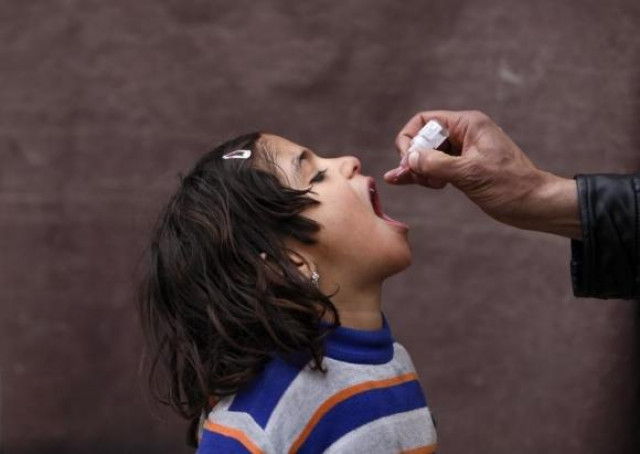Polio virus threat continues to haunt Islamabad
Positive samples, suboptimal vaccination drives a concern for eradication officials

Positive samples, suboptimal vaccination drives a concern for eradication officials. PHOTO: REUTERS
At this point Islamabad-Rawalpindi is the second hot spot after Quetta block where targets are not being consistently met.
The results of a recently held vaccination drive against polio show that Rawalpindi and rural areas of Islamabad managed by Islamabad Capital Territory (ICT) administration have performed better while urban areas that comes under the Capital Development Authority (CDA) has not been able to produce optimal coverage results.
During last week’s campaign held from July 17 to 20 out of around 310,000 targeted children in Islamabad, 282,000 have been reported as vaccinated during campaign days. Catch-up days to cover remaining children is currently under way which will continue two weeks after the campaign.
According to polio control room data, around 95 percent of observed children were found vaccinated on finger mark checking. Of 742 children found not vaccinated, 73 percent were not available at home at the time of teams visit. The parents of 30 kids (4%) refused vaccination.
On post campaign monitoring, only 3 out of 8 assessed areas could pass Lot Quality Assurance Sampling (LQAS) test in urban areas while 6 out of 8 passed in ICT, according to National Emergency Operation Centre.
In LQAS most problematic areas are assessed. In randomly selected clusters finger mark of 60 under 5 children is checked and if 4 or more found unvaccinated, the test is said to have failed. Hence a passed test indicates coverage of over 95 percent. On LQAS, persistently poor performing areas include F-11, G-10 and G-13 under CDA and Koral urban north under ICT.
In Rawalpindi out of around 820,000 targeted, 760,000 were reported to have been vaccinated in the campaign and catch up campaign is under way to cover the rest. Out of 48 assessed areas, 46 (96%) passed and 2 areas needed further improvement.
Officials say although the number of target children in Rawalpindi is almost thrice of Islamabad still it is doing well.
Meanwhile, environmental samples from Sabzi Mandi (CDA) and Safdarabad (Rawalpindi) collected on 10th July were again positive for wild polio virus indicating continued risk in twin cities.
Officials say in an effort to protect any vulnerable children, another response vaccination round will have to be conducted in twin cities from 7th August ahead of first nationwide campaign of next low season starting 18th September.
The Minister for National Health Services Saira Afzal Tarar presiding over a polio review meeting in early June had asked the city administration to fill human resource gaps in the polio campaigns in Islamabad for effective vaccination drives. According to officials, about 400 volunteers were needed to carry out effective vaccination campaigns in Islamabad as hundreds of seats of vaccinators and medical officers have been lying vacant for years in CDA.
But officials believe both ICT and CDA have human resource issues but personal involvement of Chief Commissioner and his team in ICT has been trying to overcome the challenges and doing well since January. But on the part of CDA there is a serious crises of commitment that is evident from the fact that they have not convened any meeting to review this threat nor have they bothered to attend any such meeting at Islamabad Polio Control Room established at Chief Commissioner office.
The case moved by the health directorate of CDA for recruitment against vacant positions and assignment of staff for vaccination drive is stuck in the CDA, one of the officials said.
The current polio count of 3 vs 13 same point last year and cleaning of chronic viruses from Karachi and Khyber-Peshawar are extremely encouraging development, officials say. Final battle is now on in southern corridor - Quetta block linked to Kandhar and Hilmand. And, the only other remaining zone of concern for Pakistan is now Islamabad-Rawalpindi that needs the commitment of Islamabad’s leadership to achieve polio interruption in 2017.
Published in The Express Tribune, July 24th, 2017.



















COMMENTS
Comments are moderated and generally will be posted if they are on-topic and not abusive.
For more information, please see our Comments FAQ